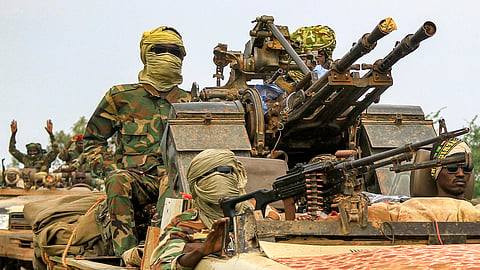UAE steps up diplomatic drive to end Sudan’s civil war
Abu Dhabi emerges as a key force for a peaceful resolution

Abu Dhabi: The United Arab Emirates is leading an extensive political and diplomatic initiative aimed at ending the civil war in Sudan, as part of a high-level agenda coordinated with regional and international partners. The UAE’s role in supporting a peaceful settlement to the Sudanese crisis has been particularly visible through the efforts of the International Quad Committee, which is advancing a key initiative to end the conflict through a humanitarian truce followed by a civilian-led political transition.
The UAE has stressed the urgent need to protect Sudanese civilians and ensure the immediate and unimpeded delivery of humanitarian aid across the country, while emphasising the importance of holding those responsible for crimes and violations accountable.
Throughout November, the UAE intensified its political and diplomatic efforts to support a political solution to the Sudanese crisis, reaffirming its full backing for regional and international efforts to impose an immediate humanitarian ceasefire and a comprehensive halt to hostilities. Such measures, the UAE stressed, are essential to allow aid to reach affected populations and to end the prolonged suffering of civilians since the outbreak of the civil war.
Military escalation breaches international law
The UAE has strongly condemned the grave humanitarian violations and horrific crimes committed against civilians in conflict-affected areas across Sudan, including in El Fasher. Abu Dhabi affirmed that targeting civilians, residential neighbourhoods, and vital facilities in areas witnessing armed clashes constitutes a dangerous escalation and a flagrant breach of international humanitarian law and fundamental human values. The atrocities witnessed in the country, the UAE noted, amount to crimes against humanity that demand a unified and decisive international response.
UAE: Exploiting humanitarian suffering is unacceptable
The Ministry of Foreign Affairs stressed that warring parties must uphold their full responsibilities to protect civilians and ensure the safe and urgent delivery of humanitarian aid. The UAE reaffirmed that exploiting humanitarian suffering or aid for political or military purposes is unacceptable and condemnable.
The Ministry denounced the reprehensible attacks on civilians in El Fasher and other conflict zones in Sudan, describing them as blatant violations of international humanitarian law. It called on both the Rapid Support Forces (RSF) and the Sudanese Armed Forces (SAF) to protect civilians and aid workers, insisting on full compliance with international humanitarian law, including the facilitation of humanitarian corridors. The UAE also urged the international community to hold perpetrators of atrocities accountable — a stance reflecting its unwavering commitment to civilian protection and peace in Sudan.
Official statements issued by the UAE Ministry of Foreign Affairs highlighted the devastating consequences faced by the Sudanese people, including indiscriminate shelling, executions, sexual violence, the use of chemical weapons, and the weaponisation of humanitarian aid. The UAE expressed deep concern, reiterated its firm stance against such atrocities, called for their immediate cessation, and urged intensified pressure on all parties to respect international law.
UAE position: All warring parties bear responsibility
The UAE stressed that all warring parties in Sudan are culpable for perpetuating the conflict — including through the use of chemical weapons, terrorising civilians, and obstructing humanitarian assistance. Abu Dhabi condemned these violations, emphasising that they worsen civilian suffering, and called for full accountability for all parties involved in breaching international law, with a focus on safeguarding civilian lives.
No future for Sudan under the warring actions
The UAE maintains that none of the warring factions represent Sudan’s future. Sudan, the UAE emphasised, is far greater than groups that reject peace and resort to killing, brutality, hatred, and exclusion. Abu Dhabi insists that genuine peace requires an independent civilian-led transition, free from the control of any armed faction, to ensure lasting stability centred on the interests of the Sudanese people.
The UAE further underscored that the RSF is rooted in the very military structure that legitimised and weaponised it for repression, while the armed forces’ ideological background is deeply influenced by extremist Islamist movements. According to the UAE, both factions represent two sides of the same coin — a coin of terrorism — and both obstruct peace. It therefore calls for their exclusion from the political process in favour of a civilian government.
Quad Statement a cornerstone for peace
Abu Dhabi reiterated that the Quad Statement of 12 September 2025 constitutes a solid foundation for paving a path toward peace and resolving the Sudanese crisis. The UAE believes in the Quad’s outcomes as essential to ending the war, alleviating suffering, and advancing peace, with the United States playing a central role alongside Saudi Arabia and Egypt. The UAE views the statement as a decisive step toward humanitarian and political stabilization.
The UAE also urged the international community to identify and hold accountable those who obstruct humanitarian aid or reject peace initiatives, stressing that such accountability is crucial to alleviating Sudanese suffering. It reaffirmed its rejection of politicising aid and emphasised the importance of strengthening cooperation to ensure the uninterrupted flow of humanitarian assistance.







